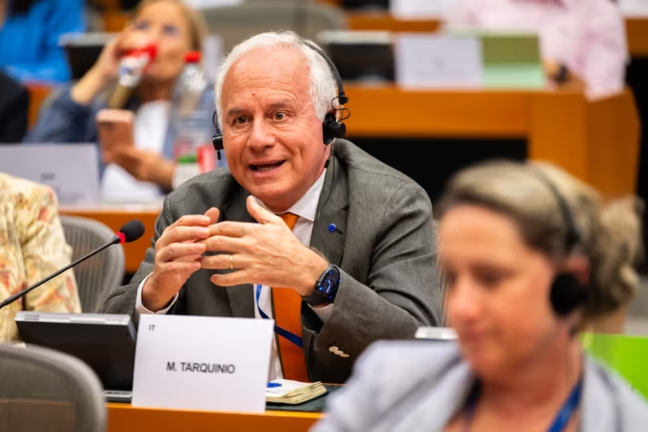MEPs warn that the European Commission’s proposal for an EU-wide list of ‘safe countries of origin’ could undermine fundamental rights. The plan is intended to speed up the assessment of asylum seekers from countries whose citizens are considered unlikely to need international protection, but lawmakers caution that such an approach may put essential safeguards at risk.
The Commission’s revised proposal risks undermining the right to effective remedy for asylum seekers, guaranteed by Article 47 of the Charter of Fundamental Rights, and constitutes a form of outsourcing of the EU’s obligations in the field of international protection. In effect, the proposal shifts responsibility to third countries while at the same time weakening access to fair and effective asylum procedures within the EU.
That is the claim made by Italian MEP Marcon Tarquinio (S&D), who is a rappoteur for the Parliament’s Subcommittee on Human Rights’ opinion.
The MEP is currently gathering support for the draft report which would highlight the human rights aspect of the proposal. Yet, as he told EU Perspectives the “frank and also sharp” discussion, in the Parliamentary subcommittee, seems caught in national disputes driven by the Italian government’s line.
You might be interested
Defending Meloni’s stance
“The ECR group – which includes the Italian delegation of Fratelli d’Italia – does not share rapporteur Marco Tarquinio’s approach, which ends up weakening, if not nullifying, the European Commission’s proposal on the list of safe countries of origin. On the contrary, we strongly support this proposal, because it provides concrete and essential tools for Member States to address the migratory challenges Europe is facing today,” MEP Alberico Gambino, Vice President of the European Parliament’s Foreign Affairs Committee, declared at the DROI subcommittee (on Human Rights within the European Parliament’s Committee on Foreign Affairs).
“Those who were present at the subcommittee’s work saw how much Fratelli d’Italia and the League wanted to ‘Italianise’ the debate. It’s almost amusing but above all alarming how they keep staring at the finger rather than the moon. What these right-wing parties care about is not the protection of human rights, much less respecting the impartial role of national and European courts. Their only goal is to shut borders: ‘security’ based on rejections at all costs, not the security of people. Very little European, and very little human, I’d say,” Mr Tarquinio stressed.
Safe countries of origin where “violence is structural”
In relation to the implementation of the new Pact on Migration and Asylum, the Human Rights Subcommittee’s concern about the list of safe countries of origin centers on how “countries can be considered safe where violence is structural, torture is still practiced, and the death penalty remains in place. We are at a crucial crossroads. But it’s well known that this Commission has set itself the goal of outsourcing borders. Yet if human rights and the lives of vulnerable people are sacrificed in the process, then reason and sound law must prevail. Otherwise, consent cannot and must not be given,” he told EU Perspectives.
From those standing in for Prime Minister Meloni in the European Parliament – at the forefront of promoting the Albania model – “the Commission’s proposal is based on a solid legal framework, on objective criteria, and on data provided by the European Union Agency for Asylum,” Mr Gambino explained. “It is therefore incorrect to claim that the criteria are arbitrary or that the accelerated procedure reduces fundamental rights: individual case assessment remains fully guaranteed, and the right to appeal is clearly ensured.” For Gambino, therefore, “rejecting the list outright means ignoring the technical work carried out by European institutions, weakening the credibility of the common system, and perpetuating the inefficiencies we have known in the past.”
The great absent presence: the EPP
Hopes for any significant change to the Commission’s legislative proposal remain low since “the room for maneuver is rather narrow, both in DROI and in LIBE,” and the largest group in the European Parliament, the EPP, did not attend the subcommittee during rapporteur Tarquinio’s presentation of his draft proposal: a “signal that reveals little interest from the largest political group in mediating and working together,” unlike the approach of other pro-European groups. “I am struck, though not surprised, by the impulse of the right-wing parties to dismiss human rights as a leftist whim rather than accepting them as shared cornerstone values of our Union. This qualifies these right-wingers, and it should compel EU co-legislators to dispel any ambiguity in defining the list,” he stated.
What’s next?
The DROI subcommittee is expected to conclude its internal negotiations by the end of November and will then send its opinion to the LIBE committee in charge of the file, which will in turn analyse and potentially amend the proposal.
ECR rapporteur Alessandro Ciriani, a member of the LIBE committee, “absolutely wants to conclude the process by the end of the year, to then move on to trilogues at the beginning of 2026,” Mr Tarquinio warned.
For Fratelli d’Italia, Mr Tarquinio’s approach is not constructive and does not help the work that MEP Alessandro Ciriani is leading as rapporteur in LIBE on this dossier. “This is why we call for proceeding without further delays, because the Commission’s proposal, together with other initiatives – particularly the Return Regulation – represents a paradigm shift in migration management and an essential tool to combine border protection, the efficiency of national systems, and the protection of people,” Mr Gambino concluded.











